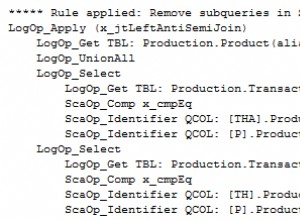Entscheidend für mich ist, ob ich meine Abfragespalten mit * aufrufe .
Mit bind_result() wäre dafür besser:
// Use bind_result() with fetch()
$query1 = 'SELECT id, first_name, last_name, username FROM table WHERE id = ?';
Mit get_result() wäre dafür besser:
// Use get_result() with fetch_assoc()
$query2 = 'SELECT * FROM table WHERE id = ?';
Beispiel 1 für $query1 mit bind_result()
$query1 = 'SELECT id, first_name, last_name, username FROM table WHERE id = ?';
$id = 5;
if($stmt = $mysqli->prepare($query)){
/*
Binds variables to prepared statement
i corresponding variable has type integer
d corresponding variable has type double
s corresponding variable has type string
b corresponding variable is a blob and will be sent in packets
*/
$stmt->bind_param('i',$id);
/* execute query */
$stmt->execute();
/* Store the result (to get properties) */
$stmt->store_result();
/* Get the number of rows */
$num_of_rows = $stmt->num_rows;
/* Bind the result to variables */
$stmt->bind_result($id, $first_name, $last_name, $username);
while ($stmt->fetch()) {
echo 'ID: '.$id.'<br>';
echo 'First Name: '.$first_name.'<br>';
echo 'Last Name: '.$last_name.'<br>';
echo 'Username: '.$username.'<br><br>';
}
/* free results */
$stmt->free_result();
/* close statement */
$stmt->close();
}
/* close connection */
$mysqli->close();
Beispiel 2 für $query2 mit get_result()
$query2 = 'SELECT * FROM table WHERE id = ?';
$id = 5;
if($stmt = $mysqli->prepare($query)){
/*
Binds variables to prepared statement
i corresponding variable has type integer
d corresponding variable has type double
s corresponding variable has type string
b corresponding variable is a blob and will be sent in packets
*/
$stmt->bind_param('i',$id);
/* execute query */
$stmt->execute();
/* Get the result */
$result = $stmt->get_result();
/* Get the number of rows */
$num_of_rows = $result->num_rows;
while ($row = $result->fetch_assoc()) {
echo 'ID: '.$row['id'].'<br>';
echo 'First Name: '.$row['first_name'].'<br>';
echo 'Last Name: '.$row['last_name'].'<br>';
echo 'Username: '.$row['username'].'<br><br>';
}
/* free results */
$stmt->free_result();
/* close statement */
$stmt->close();
}
/* close connection */
$mysqli->close();
Wie Sie sehen, können Sie bind_result nicht verwenden mit * . Allerdings get_result funktioniert für beide, aber bind_result ist einfacher und beseitigt einiges an Chaos mit $row['name'] .
bind_result()
Vorteile:
- Einfacher
- Kein Grund, sich mit
$row['name']herumzuärgern - Verwendet
fetch()
Nachteile:
- Funktioniert nicht mit SQL-Abfragen, die
*verwenden
get_result()
Vorteile:
- Funktioniert mit allen SQL-Anweisungen
- Verwendet
fetch_assoc()
Nachteile:
- Muss mit Array-Variablen herumspielen
$row[] - Nicht so ordentlich
- erfordert nativen MySQL-Treiber (mysqlnd ). )




